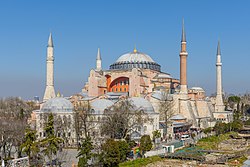
| Byzantine culture |
|---|
 |
The Eastern Roman Empire was a Greek-dominant empire that succeeded the eastern half of the Roman Empire. The culture evolved for thousand and fifty-eight years of its existence and, at its peak, covered an area from southern Spain to modern Armenia before being swallowed up by the rising Ottoman Empire. These Roman diasporas left one of the old great cities, Constantinople, to its fate, spreading the Renaissance as a revival of traditional Roman architecture along with these antiquity ideas.
Social class
editCuisine
editEducation
editEntertainment
editSport
editIn the capital city, the Hippodrome (a Greek East of the Latin West of circus) was a place of traditional Roman chariot racing, composed of two major factions, the Green and the Blue.[1] This stadium contained 80,000 spectators and edifices from anywhere in the empire (i.e., the Obelisk of Theodosius).[2]
The arts
editArchitecture
editReferences
editNotes
editCitations
edit- ^ Cameron, Averil (2002). The Mediterranean World in Late Antiquity. Routledge. p. 27. ISBN 978-1-134-98081-9.
- ^ Rautman 2006, p. 111.
Sources
edit- Rautman, Marcus (2006). Daily life in the Byzantine Empire. Greenwood Publishing Group. ISBN 978-0-313-32437-6.